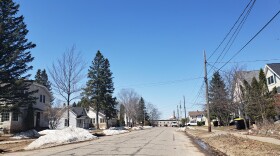Rhinelander residents could get a hazard tree removed one planted in its place, at no charge to them, through a grant funded project by the City of Rhinelander.
Plus, for every tree planted on private property, one will be planted on public property.
Rhinelander City Forester Tom Jerow says they’ll be concentrating on planting trees that support pollinators.
“Things like basswood, flowering trees, and even oak which aren't pollinated by pollinators, but pollinators live on oak, and that's a host plant for hundreds of moth species, and so it's really important to pollinator species,” said Jerow. “That's one of the benefits that trees provide, is habitat for wildlife, including pollinators.”
As part of getting a tree, the property owner will need to water it the first two years and are a responsible for maintaining it.
There are limited number of trees they’ll be able to remove. Trees that are considered most hazardous will be prioritized and only those within the City of Rhinelander will be considered.
When it comes to planting the trees on public property, Jerow says one of the priority areas will be where there’s been major street projects that required removing trees like on Oneida Avenue and on the current Messer Street Project.
“Trees, when these street projects happen, which is every 50/75 years, they need to come down, there's no getting around it,” said Jerow. “Particularly the mature trees, many of the roots extend underneath the street, and so when they dig down to replace the sewer and water, you're going to kill them anyway, so the best practice is just to cut them down at the beginning and then come back and replant.”
Jerow says there’s a lot of planning when it comes to replanting after these street projects, saying that trees are considered infrastructure no different than the road or concrete.
“A street lined with trees, the pavement will last longer. If the street is shaded, it just protects it from rain and sun and the harsh elements, and the street will last longer,” said Jerow. “It's important to avoid utilities overhead, underground, and that's part of all the planning and placing the right tree, in the right spot.”
For more information about the Urban Forest Project, contact Tom Jerow, Rhinelander City Forester: cell 715-401-1578; email: forester@rhinelanderwi.us.
Jerow will also be at the Earth Day Fair at Nicolet College Lakeside Center on Tuesday giving a presentation on “Landscaping for Energy Savings.”
He says saving on cooling costs is just one of many benefits of trees.
“Communities that have good urban forest have better health outcomes. You know, people with asthma have better air quality. People get out and walk more, and so that benefits their health. And then finally, just the mental health. You know, people have really strong health issues benefit from having trees,” said Jerow.
The goal is to plant 200 trees with the grant funding.
Some of the funding will also be used to plant an additional 20 to 30 fruit-bearing trees as part of an effort to establish a food forest.
“We're going to be planting fruit trees, plums, apples, along with some berries and things like that,” said Jerow. “It'll be publicly accessible, so people will be able to come and pick their own fruit. It's not going to be a huge orchard or anything like that, but it's something to help build food security.”
Jerow says there’s no location chosen for the food forest yet.





